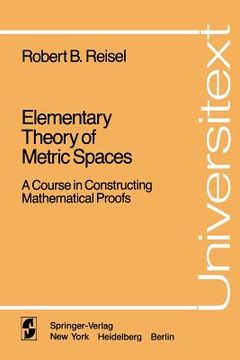Synopsis "elementary theory of metric spaces: a course in constructing mathematical proofs"
Science students have to spend much of their time learning how to do laboratory work, even if they intend to become theoretical, rather than experimental, scientists. It is important that they understand how experiments are performed and what the results mean. In science the validity of ideas is checked by experiments. If a new idea does not work in the laboratory, it must be discarded. If it does work, it is accepted, at least tentatively. In science, therefore, laboratory experiments are the touchstones for the acceptance or rejection of results. Mathematics is different. This is not to say that experiments are not part of the subject. Numerical calculations and the examina- tion of special and simplified cases are important in leading mathematicians to make conjectures, but the acceptance of a conjecture as a theorem only comes when a proof has been constructed. In other words, proofs are to mathematics as laboratory experiments are to science. Mathematics students must, therefore, learn to know what constitute valid proofs and how to construct them. How is this done? Like everything else, by doing. Mathematics students must try to prove results and then have their work criticized by experienced mathematicians. They must critically examine proofs, both correct and incorrect ones, and develop an appreciation of good style. They must, of course, start with easy proofs and build to more complicated ones.

